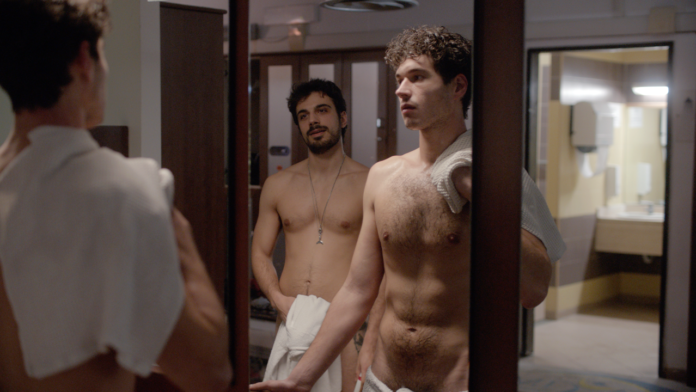The enchanting Italian import, “Mascarpone,” available May 10 on VOD and DVD, is a gay reworking of “An Unmarried Woman.” Nearly 30, Antonio (Giancarlo Commare), is set adrift when Lorenzo (Carlo Calderone), his husband of 12 years, tells him, “It’s over.” Forced to move out, Antonio moves in with Denis (Eduardo Valdarnini), and gets a job in Luca’s (Gianmarco Saurino) bakery. These two gay “guardian angels” provide Antonio with sensible life lessons and guidance so he does not “hide in someone else’s shadow” as he has done with Lorenzo.
While Antonio struggles with his pastry class and a string of romantic encounters — he gets over his breakup by sleeping with various men, including Luca — he eventually connects with Thomas (Lorenzo Adorni) and must decide what he really wants in life.
Co-writer/directors Alessandro Guida and Matteo Pilati have served up a charming romance that, like the title ingredient in tiramisu, is both sweet and comforting. The openly gay Pilati spoke with PGN about making “Mascarpone.”
The message in your film is about making your own way in the world and living your best life as a gay man. What inspired you to make this film?
When we came up with the idea, it was because we realized, in Italian cinema and elsewhere, there are very few films with LGBT characters that explore universal themes. In Italy, when the main character is not straight, the film is about coming out, or problems with law, or acceptance, or sometimes violence. These are problems in society today and our film does not explore these issues. We wanted to make a traditional romantic comedy. It’s about finding one’s own path and discovering you can be your own man even if you lived a different fulfilling life up to that point. Antonio is forced to find a new path. Everyone in life goes through that process at one time or another, no matter what our background is or how we define ourselves.
Antonio is passionate and headstrong. Can you talk about developing his character?
After his breakup, Antonio sleeps with Luca, and that frees him to sleep with everyone else. We see him with Luca and then he hooks up on the dating app. People wonder why isn’t he with Luca if the sex is OK and they are drawn to each other? He needed Luca to free himself. It’s not a closed relationship. There is no one recipe for happiness. It’s not promiscuity — it’s developing a friendship that’s so powerful and strong that you can have sex with someone without feeling obliged to certain standards in the world.
I was charmed by Denis and Luca, who guide Antonio. Can you talk about the dynamics of these gay men?
These are lonely characters that Antonio, who is not used to being alone, brings together. That’s Antonio’s magic. Denis needs to find Antonio a job to get money. Denis [knows] Luca. Antonio creates a family — an incestuous family, one might say.
The film is very sexy, with many scenes of men kissing and canoodling. Can you talk about creating a romantic film where the gay men are sex-positive, and not afraid to be openly gay in public?
It was a choice… I’d like to tell you the story in a romantic way, but sometimes reality is not as romantic. The actors were up for anything — nude scenes, sex scenes. We wanted the film to be very sex positive. I’m tired of films that describe sex as dark or a transgression. It’s not a transgression. It can be, but most of the time it’s just a way to communicate with someone. Antonio is naïve and he’s bright and positive and how he has sex reflects how he is in his life. That was our idea. We thought about explicit sex scenes, but we decided not to shoot them because we had no time to do that. We used tenderness and eros and gestures and looks.
What can you say about filming the food scenes, especially the sequence where Antonio, Denis, and Luca together create quite a sexy mess?
I was commissioning editor for two global TV companies, and we did a lot of programs and reality shows about food. Flour and cakes need to be prepared for every shot.I knew how to make it work and help the set decorators; I kept it simple. It’s about the metaphor. I looked through blogs and recipes and found out that mascarpone can be made at home and not be bought. In the film, Antonio says that making mascarpone can be tricky, but it’s untrue; making mascarpone is very easy.
What are your thoughts about mascarpone? Do you make it? Or is it not to your taste?
I don’t make it. I love to eat tiramisu. I don’t make desserts. It’s not my thing. It’s better if I stick to making movies, not cooking.

